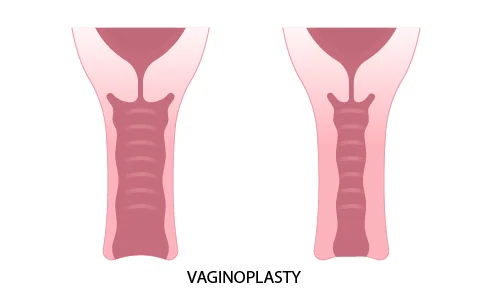Vaginoplasty is a surgical procedure aimed at reconstructing or creating the vaginal canal. It addresses complications such as vaginal atresia, congenital anomalies, trauma, and gender confirmation surgery.
If you're considering a vaginoplasty, reach out to us or book a direct appointment with our gynaecologist. At the CK Birla Hospital, we are dedicated to ensuring that your vaginoplasty is as safe, comfortable, and effective as possible. We're here to guide you every step of the way toward a successful recovery.

If vaginoplasty is not done promptly when medically indicated, several risks and consequences may arise, like:
Delaying vaginoplasty can exacerbate these risks, emphasising the importance of informed decision-making and timely medical intervention.
Vaginoplasty encompasses various surgical approaches tailored to individual needs, which are:
Consultation with a skilled surgeon is crucial to determine the optimal technique.
The cost of a vaginoplasty varies as per the specific type advised by a healthcare provider, such as:
The cost can also vary widely depending on several factors, including the location, the extent of the procedure, the surgeon’s experience, and the hospital’s pricing structure.
To get an explicit estimate for the cost of vaginoplasty at the CK Birla Hospital, contact the hospital directly. Additionally, you can consult with our board-certified gynaecologist to discuss your specific needs and receive a personalised quote for the procedure.
Before vaginoplasty, individuals undergo a comprehensive diagnosis process, which involves:
This process ensures medical appropriateness, mental preparedness, and adequate support for a successful outcome.
Post-surgery instructions for vaginoplasty involve several key aspects:
Surgically creating or reconstructing the vagina is known as vaginoplasty. It can be performed for various reasons including gender affirmation surgery, correction of vaginal defects, or as part of feminising procedures for transgender individuals.
Candidates for vaginoplasty typically include transgender women seeking gender affirmation surgery, individuals with congenital abnormalities affecting the vagina, or those who have undergone trauma or cancer treatment resulting in vaginal defects.
Vaginoplasty can result in the creation of a functional and aesthetically pleasing vagina. However, individual outcomes vary, and it’s important to have realistic expectations. Some patients may require additional procedures or ongoing care to achieve optimal results.
Many patients can engage in penetrative intercourse after vaginoplasty, but the ability to do so depends on individual healing, surgical technique, and postoperative care. Patients should follow their surgeon’s instructions and communicate any concerns or difficulties.